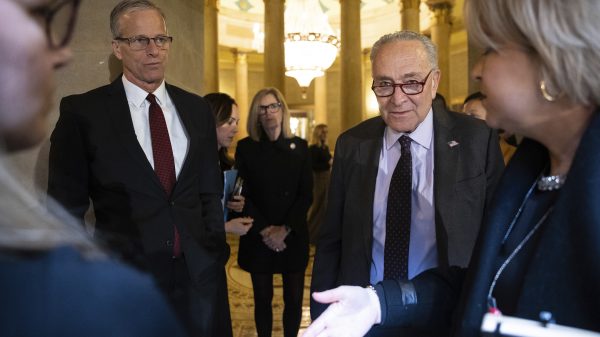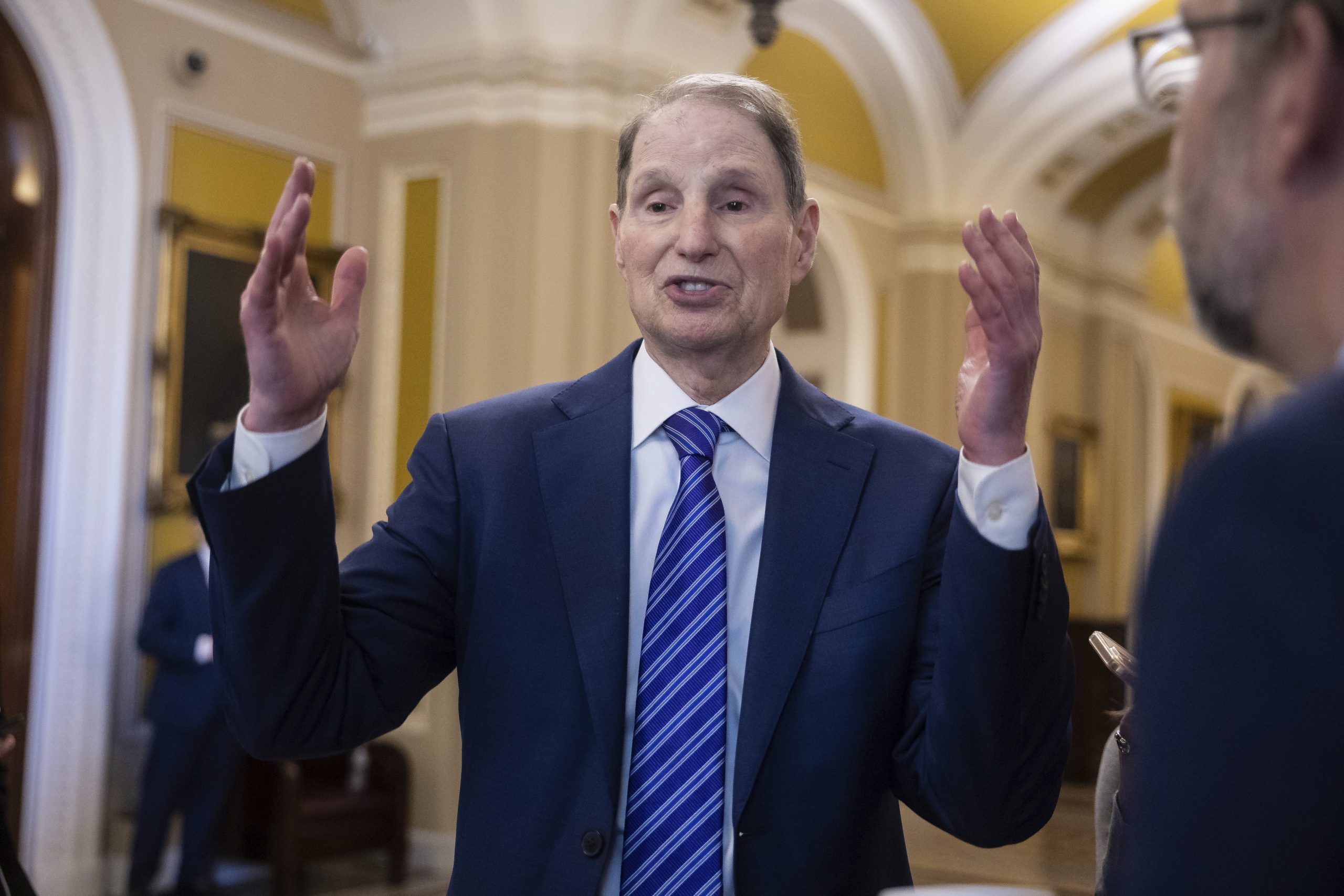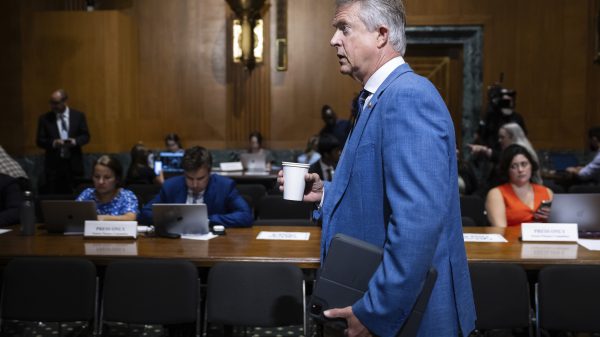A deal to extend Affordable Care Act subsidies is looking more uncertain as Senate Republicans push to make headway Friday on ending the longest-ever government shutdown.
Senate Majority Leader John Thune has promised Democrats a floor vote to prevent the enhanced subsidies from expiring at the end of the year. But Senate Democrats are splintered over how much stock to put into Thune’s commitment, given the South Dakota Republican has also said he cannot guarantee an outcome of any such vote.
Some lawmakers argue they should hold out for a concrete deal on an extension before voting to reopen the government. Others believe they could make real progress on a bipartisan framework after the government reopens, building on negotiations this fall.
Democrats are now wrestling with their options as Thune plans to force a vote Friday afternoon that would tee up consideration of a new government funding package to allow federal operations to resume. This vote is likely to fail but it presents an opportunity for some Democrats to break rank as the shutdown pain grows more severe.
At stake is a policy that Democrats argue will help millions of Americans who are set to get hit by skyrocketing premiums in 2026. It’s also putting to the test Democrats’ trust that a massively complex and politically loaded issue can be solved through old-fashioned bipartisan negotiations, with many Democrats skeptical that Republicans will ever follow through on the issue once the shutdown ends.
“This is the old days of making sure you write it into black letter law. That’s what we do when we write bills. We haven’t seen that yet,” Senate Finance Committee ranking member Ron Wyden (D-Ore.), whose panel has jurisdiction over the ACA premium tax credits, told reporters Thursday.
Sen. Chris Murphy (D-Conn.) has also been urging his colleagues to not vote to reopen the government without clear signs the subsidies would be extended, arguing that the party’s victories in elections across the country earlier this week sent a signal that voters want Democrats to keep up the fight.
“I have obviously expressed my reservations about agreeing to only a vote without a certainty of outcome,” said Murphy in an interview Thursday. “I don’t think that we should proceed without knowing that these health care premiums are not going to go up by 200 percent.”
“We’ve been talking all day today inside the caucus about what a path forward is, whether it’s negotiations that some of our colleagues have been having, or is it a different path?” Murphy added.
Those negotiations are largely being spearheaded by Sens. Jeanne Shaheen (D-N.H.), Angus King (I-Maine) and Maggie Hassan (D-N.H.), opposite rank-and-file Senate Republicans. According to two people granted anonymity to share details of ongoing conversations, Senate Democratic negotiators have been exchanging details of proposals and white papers with their Republican counterparts.
One person pointed to these discussions as evidence of “willingness from Senate Republicans to come to the table if the government is reopened,” though the other person noted that the exchange of white paper is not necessarily a strong signal of progress being made.
A third person added that this paper-trading was paused a couple weeks ago, anyway, when Republican leaders made it known they wouldn’t seriously negotiate the terms of a framework until after the government reopens.
“We’ve made it very clear that you open up government, and then we can work on a solution that will actually stand the test of time — including one that our president could perhaps consider supporting and convincing the House to support but nothing is going to happen until we open up government,” said Sen. Mike Rounds (R-S.D.).
Internal differences on the policy are not Democrats’ only problem. Even if Democrats get a vote on an extension of the Obamacare subsidies in the Senate, House Speaker Mike Johnson won’t commit to putting such a bill on the House floor, saying Thursday morning that he’s not “promising anybody anything.” Johnson is facing heavy resistance from his right flank on the issue, with members of the House Freedom Caucus promising to revolt if the subsidies are extended.
Democrats also have to figure out which modifications to the credits they are willing to accept. Some proposals pushed by Republicans, like those that would put an income cap on the credits, appear palatable, while other ideas like restricting the subsidies from plans that cover abortion promise to be non-starters.
“I would call that exceedingly frustrating. There’s several unanswered questions, and that’s one of them,” said Sen. John Hickenlooper (D-Colo.), when asked about Johnson’s refusal to commit to a vote, in an interview Thursday. “I understand the position that the speaker’s in politically, but that’s why President [Donald] Trump could get all this done. Because he could, if he got involved and pushed a negotiation, he could give Speaker Johnson the cover he needs to give it a vote in the House.”
The White House has, however, given congressional Republicans little to work with. Trump has so far been silent on the issue publicly, while people inside his administration are reportedly divided on whether to let the subsidies expire or extend them for the purposes of political preservation in next year’s midterms.
Besides exhorting Trump to get involved, some freshmen senators who won their seats after serving in the House are hoping that their relationships with their old GOP colleagues could spur momentum for a bipartisan proposal. Democratic Sens. Andy Kim of New Jersey and Lisa Blunt Rochester of Delaware invited GOP Reps. Brian Fitzpatrick of Pennsylvania and Jeff Van Drew of New Jersey to huddle Friday morning to see if they can find a way forward.
One possible idea being broached by some Senate Democrats includes having House counterparts pursue a discharge petition, a procedural maneuver allowing rank-and-file members to force a vote on legislation without the blessing of leadership. In this case, though, it’s not clear whether enough Republicans would sign onto a bill to extend the subsidies to clear the necessary 218-signature threshold to get the measure onto the floor.
“A number of us that have come out of the House recently and have relationships in the House want to have a dialogue with our House Republican counterparts to see whether there’s a way to work forward to extend the Affordable Care tax credits and find our way out of this both health crisis and government shutdown,” said Sen. Adam Schiff (D-Calif.), one of the first-term lawmakers engaged in talks.
As for Johnson refusing to commit to a vote, Schiff said, “He’ll do whatever Donald Trump tells him to do.”
Jordain Carney and Meredith Lee Hill contributed to this report.












